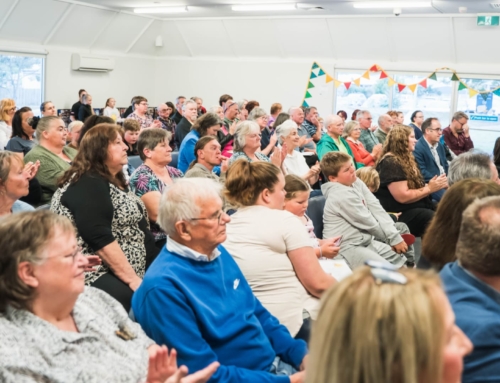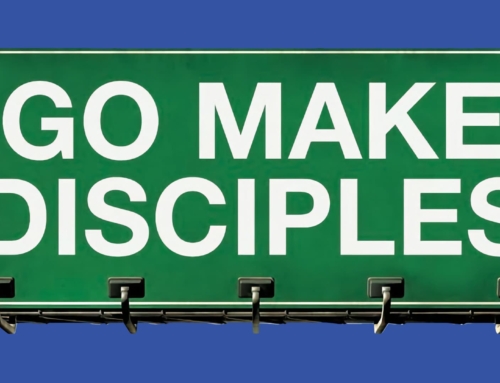
Anointed to take good news to the poor
BY DERMOT COTTULI
The anointing of the Holy Spirit was never meant to be an end in itself but rather an empowering for mission, a mission that is seen in, and through, the good works we do in community.
When Jesus was led into the wilderness by the Holy Spirit after his baptism we read that he was full of the Holy Spirit. When he came out of the wilderness at the start of his 3 years of ministry, we read in Luke 4 that he came out in the power of the Holy Spirit. It’s at this stage in the narrative that our old-timers start getting excited. Then Jesus heads back home and goes along to his local synagogue on the sabbath. He gets handed the scroll of Isaiah to read from and opens up to Isaiah 61 – He starts reading and the first words out of his mouth are, “The Spirit of the Sovereign Lord is upon me, for the Lord has anointed me…” This is the bit we as pentecostals love! But it doesn’t stop there, Jesus then goes on to say WHY he’s been anointed – it’s to bring good news to the poor.
Luke 4:11-19
When he came to the village of Nazareth, his boyhood home, he went as usual to the synagogue on the Sabbath and stood up to read the Scriptures. The scroll of Isaiah the prophet was handed to him. He unrolled the scroll and found the place where this was written:
“The Spirit of the Lord is upon me,
for he has anointed me TO bring Good News to the poor.
He has sent me to proclaim that captives will be released,
that the blind will see,
that the oppressed will be set free,
and that the time of the Lord’s favour has come.”
Did you see that?
The very first group of people that Jesus mentions are the poor, and he links his anointing by the Holy Spirit directly to his mission to the poor.
If the alleviation of poverty and injustice doesn’t feature prominently in your teaching and practice in your local church you’re in danger of becoming a Pharisee, and not the good type, the type that Jesus saved up his greatest condemnation for.
If Jesus used Isaiah 61 as his missional mandate how can we park ourselves at the anointing and not move on to the very reason that the anointing is given, reaching the poor and the oppressed?
“Could it be that the only true justification we have for the anointing of God’s Spirit is when we’re engaged in Jesus’ mission to the poor? That maybe it’s not a lack of passion and desire for the gifts but rather a lack of obedience to reach our communities through our good deeds that is keeping us from seeing the miraculous that was so evident in Jesus’ ministry?”
Peter, when speaking to Cornelius’s household after Jesus’ ascension and the coming of the Spirit on the fledgling church, said this about the Holy Spirit and the example that Jesus set,
Acts 10:37, 38
You know what has happened throughout the province of Judea, beginning in Galilee after the baptism that John preached— how God anointed Jesus of Nazareth with the Holy Spirit and power, and how he went around doing good and healing all who were under the power of the devil, because God was with him.
Directly after mentioning the anointing of the Holy Spirit that was on Jesus, Peter says that Jesus went around doing good, and then he continues with the bit about healing all those who were under the power of the devil. For Peter to bring it up to Cornelius shows that Jesus’ reputation was built firstly on the good that he did (You know…) and then the supernatural power that was evidenced through the miracles following his ministry.
Later in John 13 when Jesus is telling his disciples to love each other, he attaches it to his statement about the world knowing that they were his disciples by the love they expressed for each other. Notice he didn’t say by their miracles that people would know they were his disciples, but rather the way they treated those around them? That has to make you think.
John 13:34, 35
So now I am giving you a new commandment: Love each other. Just as I have loved you, you should love each other. Your love for one another will prove to the world that you are my disciples.”
It’s at this stage that some would say it’s not either/or and I would totally agree with them. The supernatural manifestation that we see through the miraculous is proof that what we say we believe is true. However the supernatural was always meant to be a supporting pillar of our mission and not the mission of the church itself. The mission of the church is to go to the poor, the marginalised, the downtrodden and those suffering injustice through no fault of their own, and through our actions and message, point them toward Jesus’ love for them.
Some people have said that a gospel that focuses on alleviating poverty and focusing on reversing societal injustice is a weak, woke version of the true gospel and that if we go down that path we will become irrelevant and miss our true call of making disciples of all nations. And yet Jesus says in Matthew 25 that unless we feed the poor, cloth the naked, open our homes to the homeless, care for the sick and visit those in prison we won’t gain entrance into heaven.
Matthew 25:31-46
“The Son of Man will come in all his glory. All the angels will come with him.
(This isn’t a parable, this is a foretelling of the future)
Then he will sit in glory on his throne. All the nations will be gathered in front of him. He will separate the people into two groups. He will be like a shepherd who separates the sheep from the goats. He will put the sheep to his right and the goats to his left.
“Then the King will speak to those on his right. He will say, ‘My Father has blessed you. Come and take what is yours. It is the kingdom prepared for you since the world was created.”
“I was hungry. And you gave me something to eat. I was thirsty. And you gave me something to drink. I was a stranger. And you invited me in. I needed clothes. And you gave them to me. I was sick. And you took care of me. I was in prison. And you came to visit me.’
“Then the people who have done what is right will answer him.”
(Just stop here for a moment – Jesus has just told us what it is that we should be doing with our lives)
‘Lord,’ they will ask, ‘when did we see you hungry and feed you? When did we see you thirsty and give you something to drink? When did we see you as a stranger and invite you in? When did we see you needing clothes and give them to you? When did we see you sick or in prison and go to visit you?’
“The King will reply, ‘What I’m about to tell you is true. Anything you did for one of the least important of these brothers and sisters of mine, you did for me.’
(And then he talks to the others)
“Then he will say to those on his left, ‘You are cursed! Go away from me into the fire that burns forever. It has been prepared for the devil and his angels. I was hungry. But you gave me nothing to eat. I was thirsty. But you gave me nothing to drink. I was a stranger. But you did not invite me in. I needed clothes. But you did not give me any. I was sick and in prison. But you did not take care of me.’
“They also will answer, ‘Lord, when did we see you hungry or thirsty and not help you? When did we see you as a stranger or needing clothes or sick or in prison and not help you?’
“He will reply, ‘What I’m about to tell you is true. Anything you didn’t do for one of the least important of these, you didn’t do for me.’
“Then they will go away to be punished forever. But those who have done what is right will receive eternal life.”
(If that doesn’t give you pause…)
And then we have Isaiah 58 where God through the Prophet Isaiah is incredibly brutal in the response he gives to Israel’s religious efforts which they were taking great pride in at the time. All their praying, all their fasting, all their seeking of God was considered worthless because they weren’t spending their lives to alleviate poverty and overturn the oppression that was all around them.
Isaiah 58:1-12
“Shout it aloud, do not hold back. Raise your voice like a trumpet.
Declare to my people their rebellion and to the descendants of Jacob their sins. For day after day they seek me out; they seem eager to know my ways,
as if they were a nation that does what is right and has not forsaken the commands of its God.
They ask me for just decisions and seem eager for God to come near them.
‘Why have we fasted,’ they say, ‘and you have not seen it? Why have we humbled ourselves, and you have not noticed?’
“Yet on the day of your fasting, you do as you please and exploit all your workers. Your fasting ends in quarrelling and strife, and in striking each other with wicked fists. You cannot fast as you do today and expect your voice to be heard on high.
Is this the kind of fast I have chosen, only a day for people to humble themselves? Is it only for bowing one’s head like a reed and for lying in sackcloth and ashes? Is that what you call a fast, a day acceptable to the Lord?
“Is not this the kind of fasting I have chosen: to loose the chains of injustice and untie the cords of the yoke, to set the oppressed free and break every yoke? Is it not to share your food with the hungry and to provide the poor wanderer with shelter—when you see the naked, to clothe them, and not to turn away from your own flesh and blood?
Then your light will break forth like the dawn, and your healing will quickly appear; then your righteousness will go before you, and the glory of the Lord will be your rear guard.
Then you will call, and the Lord will answer; you will cry for help, and he will say: Here am I.
“If you do away with the yoke of oppression, with the pointing finger and malicious talk, and if you spend yourselves in behalf of the hungry and satisfy the needs of the oppressed, then your light will rise in the darkness, and your night will become like the noonday.
The Lord will guide you always; he will satisfy your needs in a sun-scorched land and will strengthen your frame. You will be like a well-watered garden, like a spring whose waters never fail. Your people will rebuild the ancient ruins and will raise up the age-old foundations; you will be called Repairer of Broken Walls, Restorer of Streets with Dwellings.
So very, very practical.
When we compare this portion of Isaiah’s prophecy with the words of Jesus in Matthew 25 you can’t help but realise they’re related. The revelation of Isaiah and the words of Jesus go hand in hand.
Isaiah prophesied in a similar vein earlier in Chapter 42 and once again we see a connection with Jesus and his ministry.
Isaiah 42:1-4
“Here is my servant, whom I uphold,
my chosen one in whom I delight;
I will put my Spirit on him,
and he will bring justice to the nations.
He will not shout or cry out,
or raise his voice in the streets.
A bruised reed he will not break,
and a smouldering wick he will not snuff out.
In faithfulness he will bring forth justice;
he will not falter or be discouraged
till he establishes justice on earth.
In his teaching the islands will put their hope.”
Once again we have a correlation between the empowering of the Spirit and the mission of Jesus with a direct reference to bringing justice on the earth.
What’s sad about this particular chapter in Isaiah is that plenty of Pentecostals like to quote from it but they don’t start at the beginning, they move straight to verse 9 and then make it all about themselves and “their ministry”.
See, the former things have taken place,
and new things I declare;
before they spring into being
I announce them to you.”
Without starting at the beginning of the chapter we lose context for everything else that follows. The new things that God is declaring will happen, are spoken of in verses 5-7. They are written about before they have occurred, hence God’s declaration in verse 9
Isaiah 42:5-7
This is what God the Lord says—
the Creator of the heavens, who stretches them out,
who spreads out the earth with all that springs from it,
who gives breath to its people,
and life to those who walk on it:
“I, the Lord, have called you in righteousness;
I will take hold of your hand.
I will keep you and will make you
to be a covenant for the people
and a light for the Gentiles,
to open eyes that are blind,
to free captives from prison
and to release from the dungeon those who sit in darkness.
Sounds very similar to the mission of Jesus doesn’t it? Is it any wonder that many Bible scholars believe that Isaiah was speaking about Jesus and his future ministry.
It’s okay if you disagree with what I’ve written above but if it helps you think more clearly about your practice then that’s a good thing. Don’t be afraid to ask questions, even if you feel you’re disrespecting a sacred cow. We all see dimly as through a dark glass but we have this confidence that the Holy Spirit will lead us into all truth. So let’s not stumble over the stones in the road but instead press on to take hold of all that Jesus has for us.





